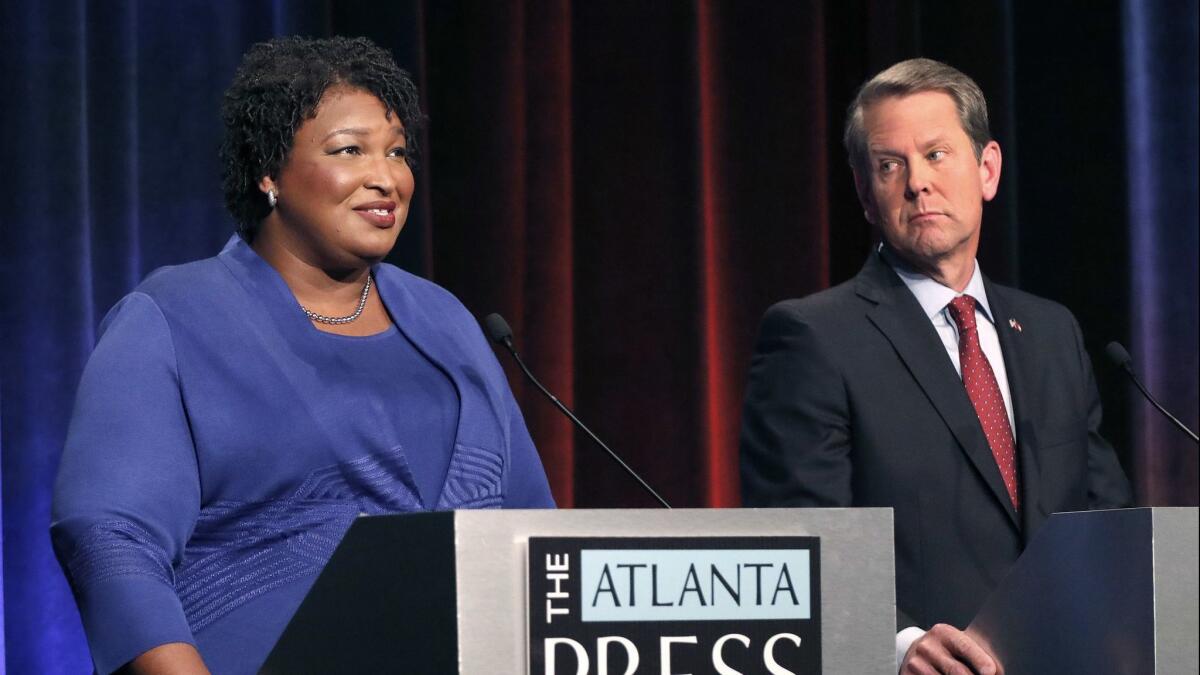Voting rights advocates eye Georgia, where close governor’s race could turn on who gets to vote

Reporting from Washington — For years, voting rights advocates have been fighting new state laws and rules that make it harder for some people to register to vote or to cast a ballot.
This year, their fight is focused on Georgia and its race for governor.
“Georgia is ground zero this cycle,” said Wendy R. Weiser, a lawyer at the Brennan Center for Justice at New York University.
While Stacey Abrams, the Democratic candidate, formerly led a project that registered new voters in Georgia, Brian Kemp, the Republican candidate and current secretary of state, led a state drive to remove hundreds of thousands of infrequent voters from the rolls. His office also put a temporary hold on the registrations of about 50,000 new voters and required voters to display a government-issued photo identification to cast a ballot.
To the surprise of many, Kemp has refused to step aside as the state’s top official supervising elections while he runs for governor against Abrams, vying to be the nation’s first female African American governor.
Elections in this country are run by states, and “many people think it is completely nuts that we allow election officials to run their own elections,” said Justin Levitt, a professor at the Loyola Law School in Los Angeles and a former voting rights lawyer at the Justice Department. “That is not an indictment of him. But people will have questions simply because he is the candidate. The norm is to hand over the reins to someone else.”
Recent polls have shown the race is tight, and if so, the outcome could turn on disputed rules over who can cast a ballot and whether the absentee ballots are counted.
Public advocacy groups like the Lawyers’ Committee for Civil Rights Under Law, Common Cause, the Campaign Legal Center and the American Civil Liberties Union have all been at work in Georgia in the courts and at polling places.
Kristen Clarke, president of the Lawyers’ Committee, said the legal fight has not been limited to one or two laws. “There has been an intensity of voter suppression at the local and state levels, and it’s been a constant presence in this election,” she said. “It seems they are trying to discourage or deter enough voters to freeze in place the status quo.”
As an example, she cited a report that thousands of absentee ballots were not being counted in Gwinnett County because of questions of whether the signatures matched the ones on file.
On Friday, in response to a lawsuit, a federal judge issued an order to Kemp’s office requiring that voters who were flagged under the state’s “exact match” law be permitted to cast ballots so long as they show proof of their identity. Georgia’s law required flagging newly registered voters if their printed name or other information differed slightly from data on file with the state.
“This is a major victory for Georgia voters and instills hope that our democracy will function as it should in Georgia on election day,” said Danielle Lang, a lawyer for the Campaign Legal Center.
Before the ruling, Kemp called the legal action “another frivolous lawsuit from liberal activist groups.” He said that since 2014, 5.6 million voter registration forms had been processed by the state, and less than 1% had been flagged for possible errors. More broadly, in rebuttal to the contention that voting has been suppressed, he said Georgia’s roll of active voters had increased by 1.4 million since 2010.
Voting rights lawyers say all of the contested rules — on purging occasional voters from the rolls, the exact-match rule for new registrants and the required government-issued ID at the polls — are more likely to affect blacks and Latinos than whites.
The effect of the state’s aggressive purge of its voting rolls remains uncertain.
In June, the U.S. Supreme Court by a 5-4 vote upheld Ohio’s policy of removing voters from the rolls if they had not voted during several elections and failed to respond to a notice in the mail. Georgia enforced a similar policy and removed more than 600,000 registrants last year.
These people may have moved or died. Others may have chosen not to vote in recent elections and ignored the notices. If these voters who have been removed from the rolls try to cast a ballot next week, they will be turned away.
“I think this clearly will have an impact this year. Whether it can be overcome remains to be seen,” said Atlanta attorney Emmet Bondurant, who filed a suit on behalf of Common Cause challenging Georgia’s voter purge policy. “Stacey Abrams has focused on turning out infrequent voters. And hundreds of thousands of them have been removed.” If those occasional voters did not re-register, “it’s too late to cure it now,” he said.
But some political experts think a surge of enthusiasm will bring far more voters to the polls this year.
Still, the dispute over voter suppression laws has grown more intense over the last decade and shows no signs of waning. The Brennan Center has closely tracked the trend, and Weiser cites four notable years.
First was the Supreme Court’s ruling in Bush vs. Gore in 2000, which ended the presidential ballot recount in Florida. “That taught a generation of political operatives that the rules of election administration could make a real difference in close races,” she said. Next was the election of President Obama in 2008, which she said triggered efforts on the right to impose new voting restrictions at the state level under the guise of preventing voter fraud. Virtually every study of voter fraud has found that it either does not exist or is too marginal to make a difference.
In 2010, Republicans swept to power in many states, and adopted an array of new laws regulating elections and voting rolls. And in 2013, the Supreme Court by a 5-4 vote struck down the key part of the Voting Rights Act that had prevented Georgia and other Southern states from enforcing new election rules without first receiving federal permission to ensure they would not have a discriminatory effect on African Americans and other minorities.
“This year, the voter suppression has been more widespread, intense and brazen,” Weiser said. “But there is also more awareness of it, so voters are more prepared now, and are not as likely to get tripped up. We hope the mobilization and the surge of enthusiasm in the end will blunt the impact of these unreasonable burdens.”
More stories from David G. Savage »
Twitter: DavidGSavage
More to Read
Get the L.A. Times Politics newsletter
Deeply reported insights into legislation, politics and policy from Sacramento, Washington and beyond. In your inbox three times per week.
You may occasionally receive promotional content from the Los Angeles Times.











